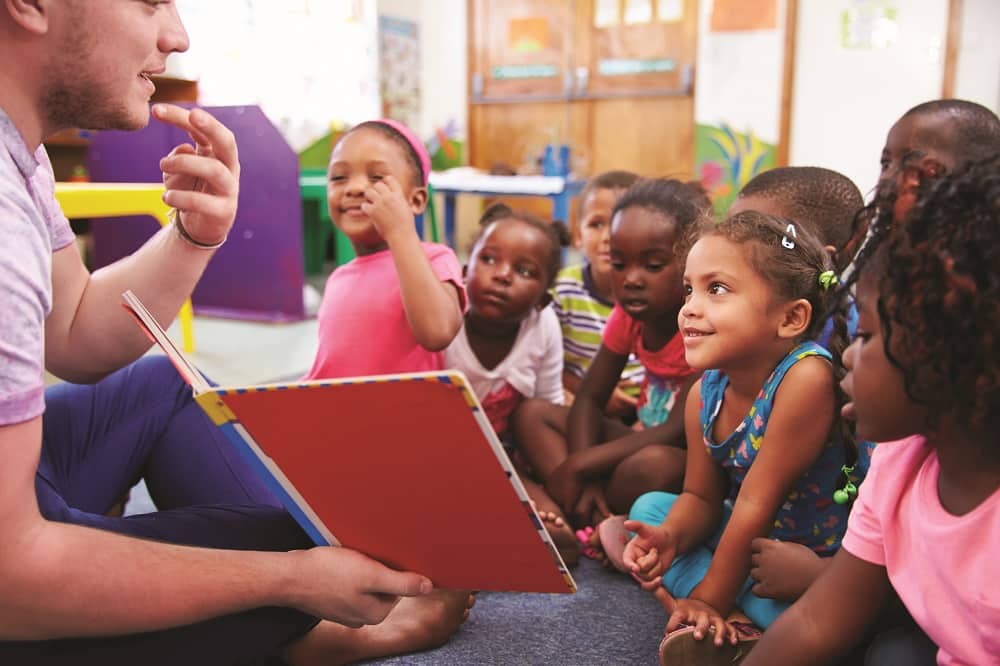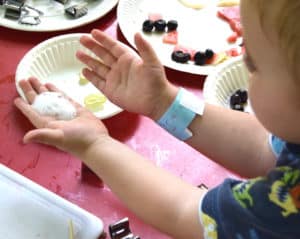
I’m Donna an Early Years Practitioner and Henry Facilitator. I run Stay & Play sessions and other parent and child sessions at our Children and Family Centres.
The closure of schools has been difficult for many children and their families. Parents have found themselves wearing the hat of parent and teacher. Juggling home schooling and work alongside maintaining family life and routine can be a challenge. Lockdown has affected us all, and I admit I have found my own mental health frayed at times, but with schools reopening we can look ahead to a life beyond lockdown. With the roadmap out of lockdown starting soon, we will hopefully be seeing some sort of normality returning to daily life and routine over the coming weeks and months.
Let’s talk about going back to school.
As schools across England will be opening in March, and children will again be returning to a setting after months away, how can we help them prepare for their return?
Does my child have to go back to school on March 8th?
Yes, all children will be required to return from March 8th unless they are extremely clinically vulnerable. This means that it is your legal duty as a parent to send your child (if they are of compulsory school age) to school.
How do I know that it will be safe?
Schools have had lots of experience on keeping the school buildings, staff and children safe over the last year and they will be working extra hard over the next two weeks to make sure the school and procedures are safe for all staff and children to return. Each school has different procedures for morning drop-off and afternoon pick-up, and they will make you aware of these before your child starts or returns.
Someone in my house is shielding does my child still have to return?
If you, someone in your household or your child is extremely clinically vulnerable have a chat with your school and see if they can keep your child safe. With all children in England expected to be in school there are new, and sometimes changing rules, in place to help prevent the spread of the coronavirus and classrooms may feel and look very different.
Will my child be safe when they return?
To ensure children, staff and parents have a smooth and safe transition, each nursery, pre-school and school will do their own health and safety risk assessment as part of their planning before reopening. They will have spent these two weeks implementing a range of protective measures to help reduce any risks, ensuring children still receive the best possible care, support and education in a safe learning environment. These will probably be sent to you via email before term restarts so you and your child know how or if things have changed since last term.
Many childcare settings have created a walk-through of their setting to help support children and families with the transition back. It explains all new health and safety procedure such as:
- One-way systems for entering and leaving the setting when dropping off and collecting children.
- Hygiene procedures like hand washing when entering
- Food preparation & lunch time routines.
- Toilet routines
- PPE such as face coverings
- Settling your child in
My child is really excited to go back to school and I know it’s the right thing but I’m still nervous
For many parents the prospect of sending their child back to school can be a daunting time. You may have concerns about their safety, what your child’s day will look like and how they will cope with any changes, or you might be worried about how your child’s health and other care needs will be met while they are there, and if they will be safe. This is perfectly natural and you definitely aren’t alone.
When the time comes for your child to return to school it’s OK to feel anxious about the new changes that will be required for you and your child. Or you may feel very ready to send your child back and that’s OK too. There are no right or wrong ways to feel about it. As parents we should trust our feelings and be secure in our knowledge that we are our child’s first educators and know them better than anyone else.
Children are incredibly resilient and adapt really quickly to changes. Most will be so excited to see their friends, teachers or other staff that many possibly won’t even notice any changes too much, they may even prefer them!
The last few months have been full of change for most of us, but the one thing that has been constant in your child’s life is you! As their parent, you have been there to carry out and implement new routines and rituals. Explain and help them overcome any worries or fears they may have about all the changes they have seen due to the pandemic.
You have been there to nurture them with comfort, support and most importantly your love. You have done a wonderful and sometimes challenging job of keeping you and your family safe and now because of the love, care and support your child has received from you during these challenges months they are now ready to return to, or start a new school and some semblance of normality, even if you’re crying inside at the thought of them returning or leaving them all day! They will be fine. Children are a lot more resilient than we think
My child was due to start school in January, how will they make sure that they’re settling in well?
Settling your child in gradually is often the best approach, as it gives them time to adjust and familiarise themselves with their new environment, people and routines. Unfortunately, COVID-19 may have required some changes to your school’s usual process due to the size of school, size of the buildings available and to keep all children, staff and parents safe. Social distancing guidelines will continue but may be a little different to the last time you talked to your child’s school. Any changes to their settling in policy will be explained to you along with all their policies and procedures during your child’s induction and you will get the opportunity to ask any questions or concerns you may have regarding your child settling. This may be a little different to what you were expecting but your child will not know this and will adapt to whatever the new process is.
The more information you receive from your child’s setting or school about their settling in and transition procedures before your child starts the better prepared you and your child will be. One way to help you and your child with the transition is to walk or drive past the setting or school together, to familiarise them with what their new school or setting looks like, where it is, how they get there and how long the journey takes.
Young children are easily distracted, and it doesn’t take professional, experienced staff long to find something that interests them to distract your child if they start to cry. So, even if your little one is crying when you leave them, the chances are that a few minutes later they will be engrossed in an activity.
When you say goodbye to your child, childcare professionals don’t recommend a long-draw-out goodbye. Let your child know you’re leaving and that you will be returning to collect them soon. It’s best not to leave your child without letting them know as this may cause them stress and think you have left them for good. The longer you hang around the longer your child thinks there’s a chance they are going home again with you. As soon as you’re gone your child will accept they’re staying for the day and settle well. A top tip is to keep it quick even if your child is crying.
Some children who appeared to settle into their nursery or school easily and with little fuss at the start, may regress later and become tearful when left. This is common, so try not to worry, it’s not that they don’t like it, it just a stage they are going through. be patient and give lots of reassurance and, in time, things should settle down again.
Remember, your child’s school is professional, caring and experienced and will have seen most scenarios and settled many, many children in. They’ll know what your child needs and how to comfort them and have worked with children with a diverse range of developmental and emotional needs.
You know your child better than anyone, and your child’s school will work with you and your child to ensure that the settling in period is as smooth and stress free as possible for all involved.
My child has a SEND (Special Educational Need or Disability) will they get the support that they need or is outlined in their EHC Plan?
If your child has a SEND or an EHC plan and you’re concerned that they may struggle with things not being as they need them to be send an email to the SENCO (they may be too busy preparing to answer the phone) and ask how the provision on the plan will be delivered. They will be able to reassure you about how the provision will be offered so you have plenty of time to reassure your child how things might be a little bit different.
Dealing with your child’s emotions
Every child is unique, and the way they settle into the new rules around their current school will vary, depending on their individuality, personality, and emotional resilience. Some will settle with little fuss and no tears, while others may cry a lot, which can be distressing for parents.
My child is nervous about going back to school, how do I reassure them?
Some older children who have listened to news bulletins, heard lots of talk about COVID-19 or suffered a bereavement during the last few months may have their own worries, many of which may be based upon misunderstandings of what they have heard. If your child seems worried about going back to school, it can be good to have a chat with them about exactly what they’re worried about rather than just telling them they’ll be fine. You may find out that you can reassure them really easily by explaining how the school is working to keep everyone safe or talking about the vaccine. Try to keep it simple and age appropriate and remind them of all the positive things about school that they may have missed such as their friends, favourite teacher or something simple such as a lesson they enjoy. You’ll probably find that they’ll be much happier to return. Encouraging them to come and have a chat with you if they’re worried after they’ve returned to school keeps lines of communication open and will ensure that they’re not worrying on their own. 2
Brave Families is a Body & Soul initiative launched a website to support you and your family during these ever changing and uncertain times we are all living through. It is a fun and engaging resource, introducing you to short and easy to access activities that build resilience and connection.
Managing the morning rush
For many parents the morning routine and getting children ready for school can be stressful, especially as we’ve all gotten out of the routine! There are a few things you can do to make this less stressful, below are a few tips that may help:
- Set out your child’s clothes the night before.
- Pack their school bag the night before.
- Prepare packed lunches and snacks the night before.
- Do a trial run one morning before they go back – to time how long it NOW takes your child to get up, wash, brush their teeth and hair, have breakfast and get dressed including putting on their shoes ready to leave. They may have got quicker as they’re now a bit older or may be a bit slower than they used to be after being out of the routine for so long! A lot of the school run stress is due to adults not allowing enough time for children to get ready.
- Ensure your children have a good bedtime routine and are going to bed at a reasonable time, so that they are getting enough sleep and rest. This will help them get up in time. An over-tired child is not a happy one.
I hope this has been helpful, look out for tips on helping your child return and adjust to their new school routine on our website, Facebook and Instagram pages
Have a great week
Take care
Donna









